ASDA: Impact of Culture, Politics, and Power on Behaviour
VerifiedAdded on 2021/01/01
|24
|8299
|171
Report
AI Summary
This report provides a comprehensive analysis of organisational behaviour within ASDA, a UK-based supermarket retailer. It delves into the influence of organisational culture, politics, and power dynamics on individual and team behaviour and performance, utilizing Handy's typology and French and Raven's power model. The report evaluates various aspects, including power, role, task, and person cultures, and explores the impact of legitimate, reward, coercive, expert, and referent power on employee motivation and outcomes. Furthermore, it examines the effects of organisational politics on productivity and the working environment. The report also discusses content and process theories of motivation, as well as team and group development theories, providing recommendations for improving team performance and achieving organisational goals. The report concludes with an overview of organisational behaviour concepts and philosophies in the context of ASDA.
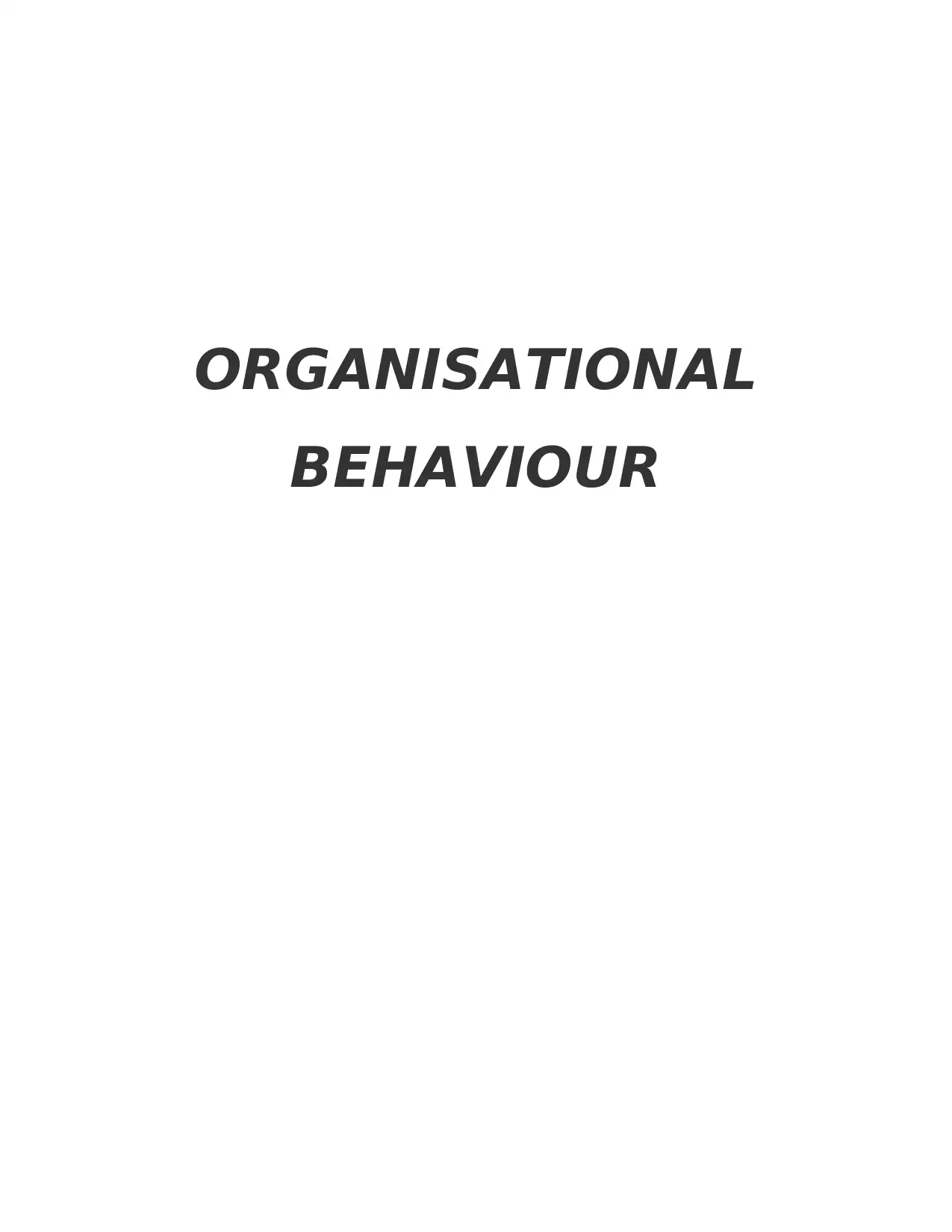
ORGANISATIONAL
BEHAVIOUR
BEHAVIOUR
Paraphrase This Document
Need a fresh take? Get an instant paraphrase of this document with our AI Paraphraser
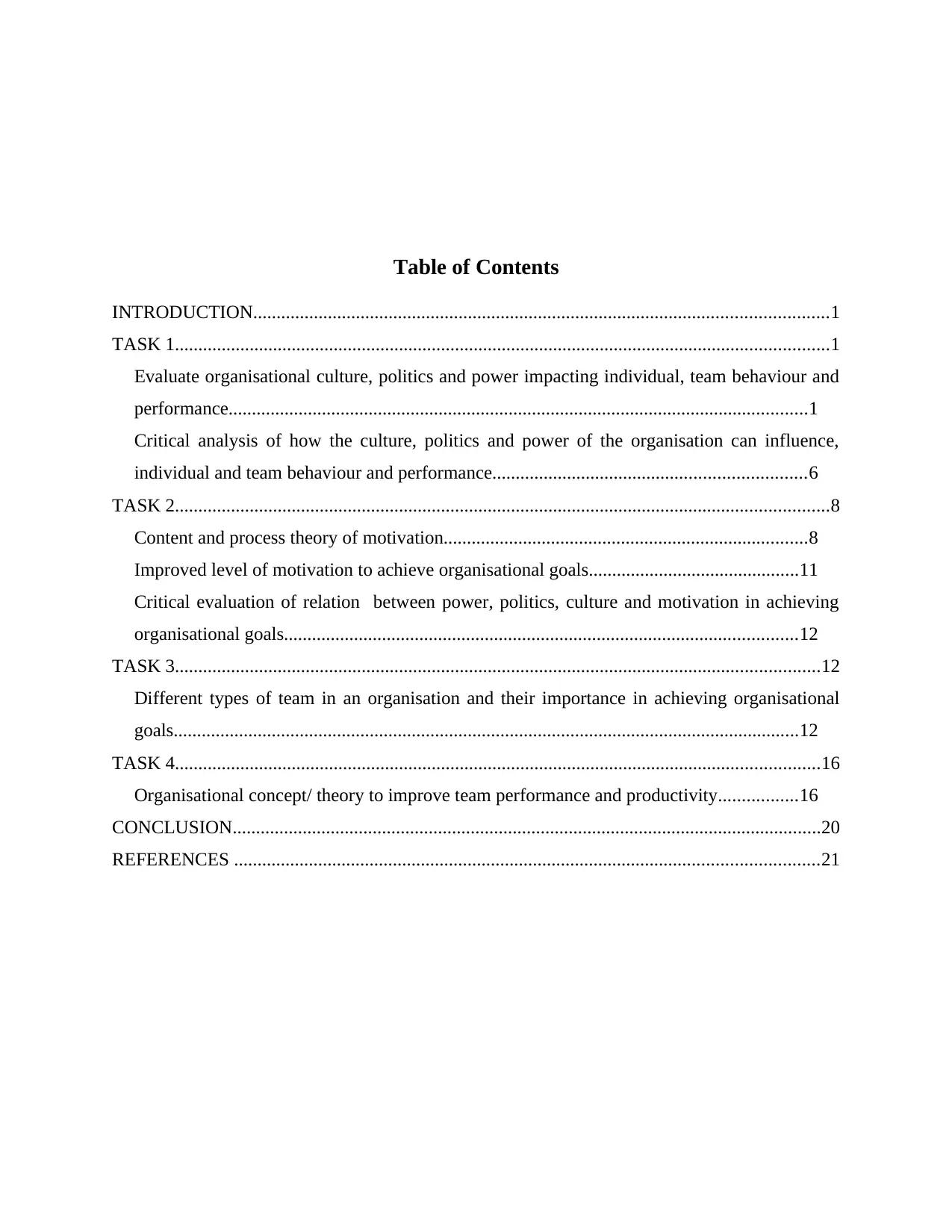
Table of Contents
INTRODUCTION...........................................................................................................................1
TASK 1............................................................................................................................................1
Evaluate organisational culture, politics and power impacting individual, team behaviour and
performance............................................................................................................................1
Critical analysis of how the culture, politics and power of the organisation can influence,
individual and team behaviour and performance...................................................................6
TASK 2............................................................................................................................................8
Content and process theory of motivation..............................................................................8
Improved level of motivation to achieve organisational goals.............................................11
Critical evaluation of relation between power, politics, culture and motivation in achieving
organisational goals..............................................................................................................12
TASK 3..........................................................................................................................................12
Different types of team in an organisation and their importance in achieving organisational
goals......................................................................................................................................12
TASK 4..........................................................................................................................................16
Organisational concept/ theory to improve team performance and productivity.................16
CONCLUSION..............................................................................................................................20
REFERENCES .............................................................................................................................21
INTRODUCTION...........................................................................................................................1
TASK 1............................................................................................................................................1
Evaluate organisational culture, politics and power impacting individual, team behaviour and
performance............................................................................................................................1
Critical analysis of how the culture, politics and power of the organisation can influence,
individual and team behaviour and performance...................................................................6
TASK 2............................................................................................................................................8
Content and process theory of motivation..............................................................................8
Improved level of motivation to achieve organisational goals.............................................11
Critical evaluation of relation between power, politics, culture and motivation in achieving
organisational goals..............................................................................................................12
TASK 3..........................................................................................................................................12
Different types of team in an organisation and their importance in achieving organisational
goals......................................................................................................................................12
TASK 4..........................................................................................................................................16
Organisational concept/ theory to improve team performance and productivity.................16
CONCLUSION..............................................................................................................................20
REFERENCES .............................................................................................................................21
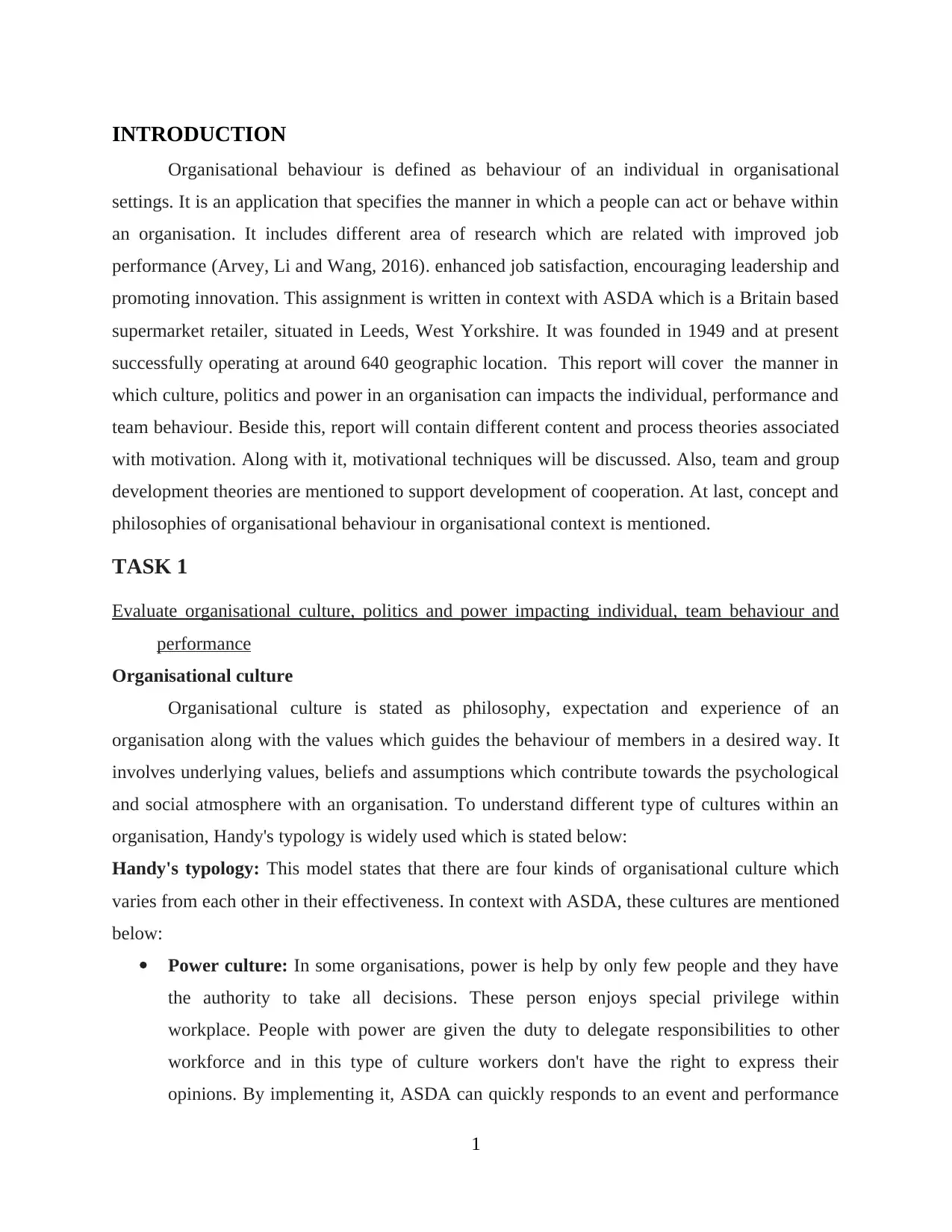
INTRODUCTION
Organisational behaviour is defined as behaviour of an individual in organisational
settings. It is an application that specifies the manner in which a people can act or behave within
an organisation. It includes different area of research which are related with improved job
performance (Arvey, Li and Wang, 2016). enhanced job satisfaction, encouraging leadership and
promoting innovation. This assignment is written in context with ASDA which is a Britain based
supermarket retailer, situated in Leeds, West Yorkshire. It was founded in 1949 and at present
successfully operating at around 640 geographic location. This report will cover the manner in
which culture, politics and power in an organisation can impacts the individual, performance and
team behaviour. Beside this, report will contain different content and process theories associated
with motivation. Along with it, motivational techniques will be discussed. Also, team and group
development theories are mentioned to support development of cooperation. At last, concept and
philosophies of organisational behaviour in organisational context is mentioned.
TASK 1
Evaluate organisational culture, politics and power impacting individual, team behaviour and
performance
Organisational culture
Organisational culture is stated as philosophy, expectation and experience of an
organisation along with the values which guides the behaviour of members in a desired way. It
involves underlying values, beliefs and assumptions which contribute towards the psychological
and social atmosphere with an organisation. To understand different type of cultures within an
organisation, Handy's typology is widely used which is stated below:
Handy's typology: This model states that there are four kinds of organisational culture which
varies from each other in their effectiveness. In context with ASDA, these cultures are mentioned
below:
Power culture: In some organisations, power is help by only few people and they have
the authority to take all decisions. These person enjoys special privilege within
workplace. People with power are given the duty to delegate responsibilities to other
workforce and in this type of culture workers don't have the right to express their
opinions. By implementing it, ASDA can quickly responds to an event and performance
1
Organisational behaviour is defined as behaviour of an individual in organisational
settings. It is an application that specifies the manner in which a people can act or behave within
an organisation. It includes different area of research which are related with improved job
performance (Arvey, Li and Wang, 2016). enhanced job satisfaction, encouraging leadership and
promoting innovation. This assignment is written in context with ASDA which is a Britain based
supermarket retailer, situated in Leeds, West Yorkshire. It was founded in 1949 and at present
successfully operating at around 640 geographic location. This report will cover the manner in
which culture, politics and power in an organisation can impacts the individual, performance and
team behaviour. Beside this, report will contain different content and process theories associated
with motivation. Along with it, motivational techniques will be discussed. Also, team and group
development theories are mentioned to support development of cooperation. At last, concept and
philosophies of organisational behaviour in organisational context is mentioned.
TASK 1
Evaluate organisational culture, politics and power impacting individual, team behaviour and
performance
Organisational culture
Organisational culture is stated as philosophy, expectation and experience of an
organisation along with the values which guides the behaviour of members in a desired way. It
involves underlying values, beliefs and assumptions which contribute towards the psychological
and social atmosphere with an organisation. To understand different type of cultures within an
organisation, Handy's typology is widely used which is stated below:
Handy's typology: This model states that there are four kinds of organisational culture which
varies from each other in their effectiveness. In context with ASDA, these cultures are mentioned
below:
Power culture: In some organisations, power is help by only few people and they have
the authority to take all decisions. These person enjoys special privilege within
workplace. People with power are given the duty to delegate responsibilities to other
workforce and in this type of culture workers don't have the right to express their
opinions. By implementing it, ASDA can quickly responds to an event and performance
1
⊘ This is a preview!⊘
Do you want full access?
Subscribe today to unlock all pages.

Trusted by 1+ million students worldwide
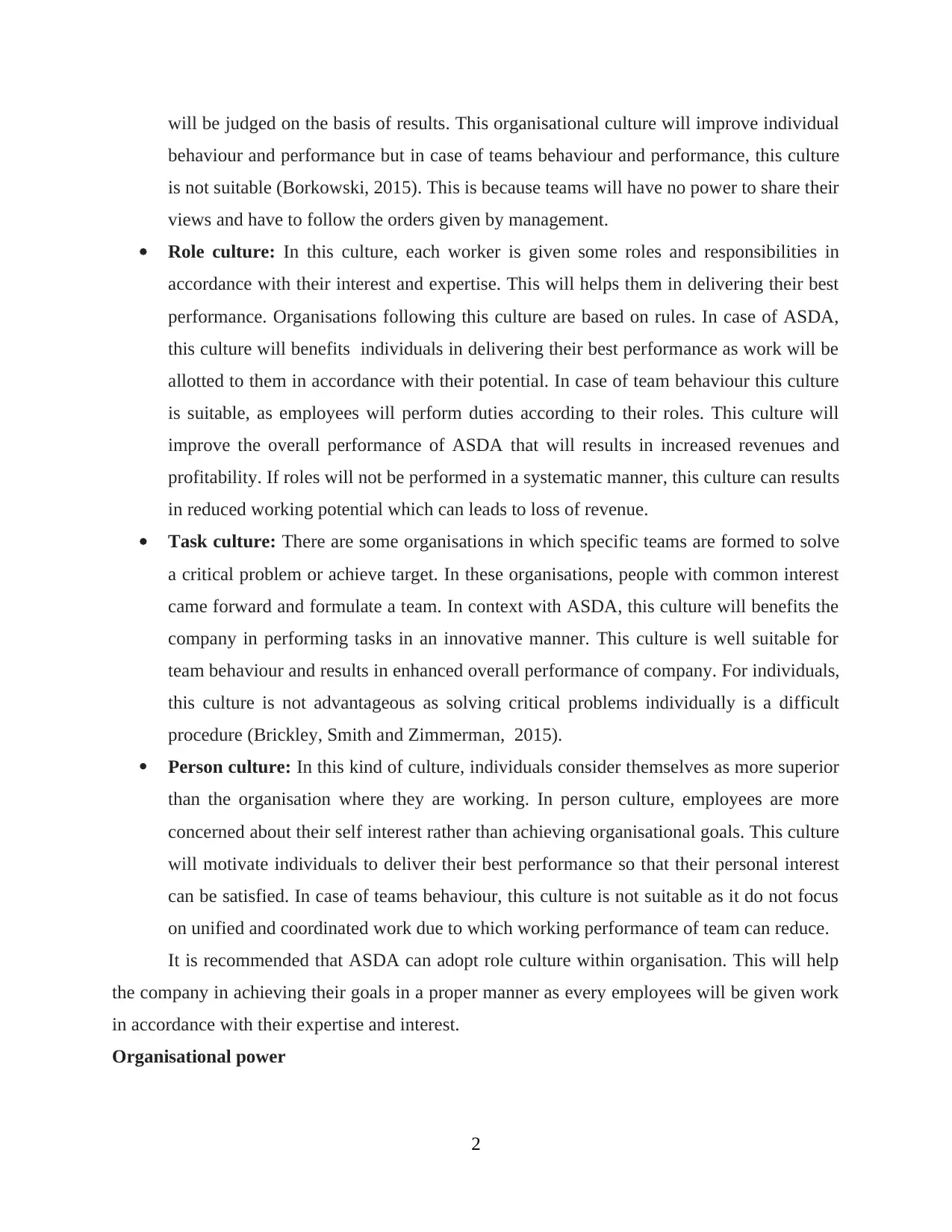
will be judged on the basis of results. This organisational culture will improve individual
behaviour and performance but in case of teams behaviour and performance, this culture
is not suitable (Borkowski, 2015). This is because teams will have no power to share their
views and have to follow the orders given by management.
Role culture: In this culture, each worker is given some roles and responsibilities in
accordance with their interest and expertise. This will helps them in delivering their best
performance. Organisations following this culture are based on rules. In case of ASDA,
this culture will benefits individuals in delivering their best performance as work will be
allotted to them in accordance with their potential. In case of team behaviour this culture
is suitable, as employees will perform duties according to their roles. This culture will
improve the overall performance of ASDA that will results in increased revenues and
profitability. If roles will not be performed in a systematic manner, this culture can results
in reduced working potential which can leads to loss of revenue.
Task culture: There are some organisations in which specific teams are formed to solve
a critical problem or achieve target. In these organisations, people with common interest
came forward and formulate a team. In context with ASDA, this culture will benefits the
company in performing tasks in an innovative manner. This culture is well suitable for
team behaviour and results in enhanced overall performance of company. For individuals,
this culture is not advantageous as solving critical problems individually is a difficult
procedure (Brickley, Smith and Zimmerman, 2015).
Person culture: In this kind of culture, individuals consider themselves as more superior
than the organisation where they are working. In person culture, employees are more
concerned about their self interest rather than achieving organisational goals. This culture
will motivate individuals to deliver their best performance so that their personal interest
can be satisfied. In case of teams behaviour, this culture is not suitable as it do not focus
on unified and coordinated work due to which working performance of team can reduce.
It is recommended that ASDA can adopt role culture within organisation. This will help
the company in achieving their goals in a proper manner as every employees will be given work
in accordance with their expertise and interest.
Organisational power
2
behaviour and performance but in case of teams behaviour and performance, this culture
is not suitable (Borkowski, 2015). This is because teams will have no power to share their
views and have to follow the orders given by management.
Role culture: In this culture, each worker is given some roles and responsibilities in
accordance with their interest and expertise. This will helps them in delivering their best
performance. Organisations following this culture are based on rules. In case of ASDA,
this culture will benefits individuals in delivering their best performance as work will be
allotted to them in accordance with their potential. In case of team behaviour this culture
is suitable, as employees will perform duties according to their roles. This culture will
improve the overall performance of ASDA that will results in increased revenues and
profitability. If roles will not be performed in a systematic manner, this culture can results
in reduced working potential which can leads to loss of revenue.
Task culture: There are some organisations in which specific teams are formed to solve
a critical problem or achieve target. In these organisations, people with common interest
came forward and formulate a team. In context with ASDA, this culture will benefits the
company in performing tasks in an innovative manner. This culture is well suitable for
team behaviour and results in enhanced overall performance of company. For individuals,
this culture is not advantageous as solving critical problems individually is a difficult
procedure (Brickley, Smith and Zimmerman, 2015).
Person culture: In this kind of culture, individuals consider themselves as more superior
than the organisation where they are working. In person culture, employees are more
concerned about their self interest rather than achieving organisational goals. This culture
will motivate individuals to deliver their best performance so that their personal interest
can be satisfied. In case of teams behaviour, this culture is not suitable as it do not focus
on unified and coordinated work due to which working performance of team can reduce.
It is recommended that ASDA can adopt role culture within organisation. This will help
the company in achieving their goals in a proper manner as every employees will be given work
in accordance with their expertise and interest.
Organisational power
2
Paraphrase This Document
Need a fresh take? Get an instant paraphrase of this document with our AI Paraphraser
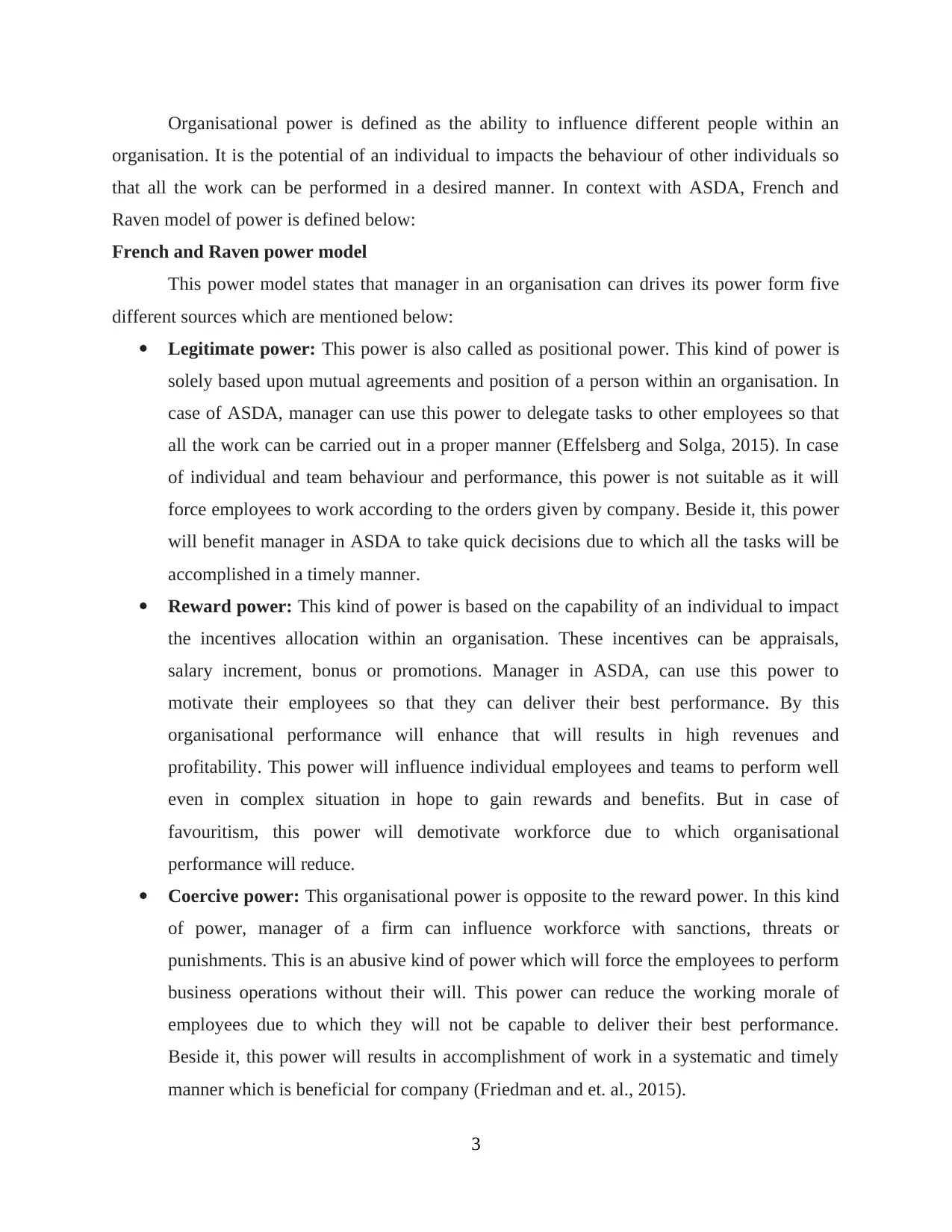
Organisational power is defined as the ability to influence different people within an
organisation. It is the potential of an individual to impacts the behaviour of other individuals so
that all the work can be performed in a desired manner. In context with ASDA, French and
Raven model of power is defined below:
French and Raven power model
This power model states that manager in an organisation can drives its power form five
different sources which are mentioned below:
Legitimate power: This power is also called as positional power. This kind of power is
solely based upon mutual agreements and position of a person within an organisation. In
case of ASDA, manager can use this power to delegate tasks to other employees so that
all the work can be carried out in a proper manner (Effelsberg and Solga, 2015). In case
of individual and team behaviour and performance, this power is not suitable as it will
force employees to work according to the orders given by company. Beside it, this power
will benefit manager in ASDA to take quick decisions due to which all the tasks will be
accomplished in a timely manner.
Reward power: This kind of power is based on the capability of an individual to impact
the incentives allocation within an organisation. These incentives can be appraisals,
salary increment, bonus or promotions. Manager in ASDA, can use this power to
motivate their employees so that they can deliver their best performance. By this
organisational performance will enhance that will results in high revenues and
profitability. This power will influence individual employees and teams to perform well
even in complex situation in hope to gain rewards and benefits. But in case of
favouritism, this power will demotivate workforce due to which organisational
performance will reduce.
Coercive power: This organisational power is opposite to the reward power. In this kind
of power, manager of a firm can influence workforce with sanctions, threats or
punishments. This is an abusive kind of power which will force the employees to perform
business operations without their will. This power can reduce the working morale of
employees due to which they will not be capable to deliver their best performance.
Beside it, this power will results in accomplishment of work in a systematic and timely
manner which is beneficial for company (Friedman and et. al., 2015).
3
organisation. It is the potential of an individual to impacts the behaviour of other individuals so
that all the work can be performed in a desired manner. In context with ASDA, French and
Raven model of power is defined below:
French and Raven power model
This power model states that manager in an organisation can drives its power form five
different sources which are mentioned below:
Legitimate power: This power is also called as positional power. This kind of power is
solely based upon mutual agreements and position of a person within an organisation. In
case of ASDA, manager can use this power to delegate tasks to other employees so that
all the work can be carried out in a proper manner (Effelsberg and Solga, 2015). In case
of individual and team behaviour and performance, this power is not suitable as it will
force employees to work according to the orders given by company. Beside it, this power
will benefit manager in ASDA to take quick decisions due to which all the tasks will be
accomplished in a timely manner.
Reward power: This kind of power is based on the capability of an individual to impact
the incentives allocation within an organisation. These incentives can be appraisals,
salary increment, bonus or promotions. Manager in ASDA, can use this power to
motivate their employees so that they can deliver their best performance. By this
organisational performance will enhance that will results in high revenues and
profitability. This power will influence individual employees and teams to perform well
even in complex situation in hope to gain rewards and benefits. But in case of
favouritism, this power will demotivate workforce due to which organisational
performance will reduce.
Coercive power: This organisational power is opposite to the reward power. In this kind
of power, manager of a firm can influence workforce with sanctions, threats or
punishments. This is an abusive kind of power which will force the employees to perform
business operations without their will. This power can reduce the working morale of
employees due to which they will not be capable to deliver their best performance.
Beside it, this power will results in accomplishment of work in a systematic and timely
manner which is beneficial for company (Friedman and et. al., 2015).
3
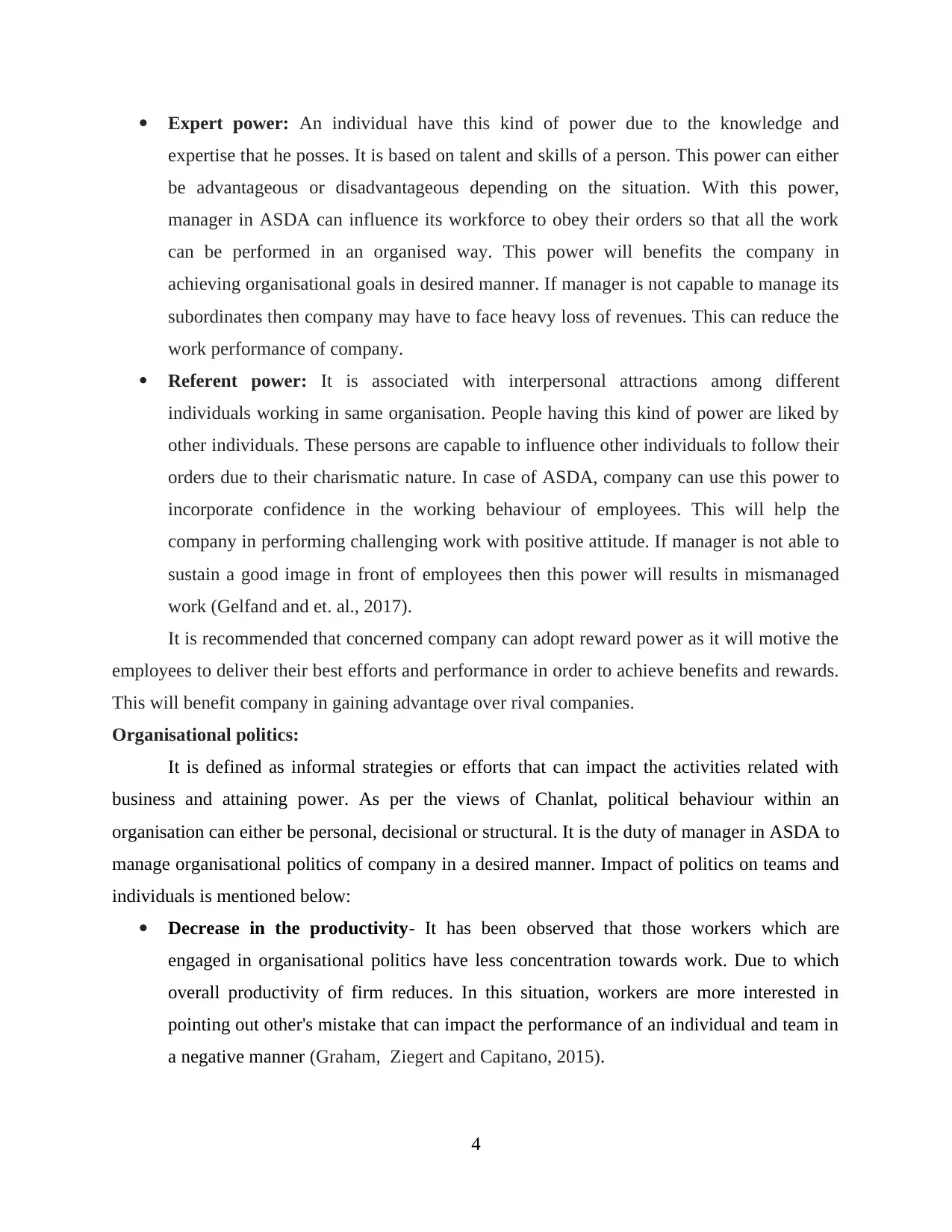
Expert power: An individual have this kind of power due to the knowledge and
expertise that he posses. It is based on talent and skills of a person. This power can either
be advantageous or disadvantageous depending on the situation. With this power,
manager in ASDA can influence its workforce to obey their orders so that all the work
can be performed in an organised way. This power will benefits the company in
achieving organisational goals in desired manner. If manager is not capable to manage its
subordinates then company may have to face heavy loss of revenues. This can reduce the
work performance of company.
Referent power: It is associated with interpersonal attractions among different
individuals working in same organisation. People having this kind of power are liked by
other individuals. These persons are capable to influence other individuals to follow their
orders due to their charismatic nature. In case of ASDA, company can use this power to
incorporate confidence in the working behaviour of employees. This will help the
company in performing challenging work with positive attitude. If manager is not able to
sustain a good image in front of employees then this power will results in mismanaged
work (Gelfand and et. al., 2017).
It is recommended that concerned company can adopt reward power as it will motive the
employees to deliver their best efforts and performance in order to achieve benefits and rewards.
This will benefit company in gaining advantage over rival companies.
Organisational politics:
It is defined as informal strategies or efforts that can impact the activities related with
business and attaining power. As per the views of Chanlat, political behaviour within an
organisation can either be personal, decisional or structural. It is the duty of manager in ASDA to
manage organisational politics of company in a desired manner. Impact of politics on teams and
individuals is mentioned below:
Decrease in the productivity- It has been observed that those workers which are
engaged in organisational politics have less concentration towards work. Due to which
overall productivity of firm reduces. In this situation, workers are more interested in
pointing out other's mistake that can impact the performance of an individual and team in
a negative manner (Graham, Ziegert and Capitano, 2015).
4
expertise that he posses. It is based on talent and skills of a person. This power can either
be advantageous or disadvantageous depending on the situation. With this power,
manager in ASDA can influence its workforce to obey their orders so that all the work
can be performed in an organised way. This power will benefits the company in
achieving organisational goals in desired manner. If manager is not capable to manage its
subordinates then company may have to face heavy loss of revenues. This can reduce the
work performance of company.
Referent power: It is associated with interpersonal attractions among different
individuals working in same organisation. People having this kind of power are liked by
other individuals. These persons are capable to influence other individuals to follow their
orders due to their charismatic nature. In case of ASDA, company can use this power to
incorporate confidence in the working behaviour of employees. This will help the
company in performing challenging work with positive attitude. If manager is not able to
sustain a good image in front of employees then this power will results in mismanaged
work (Gelfand and et. al., 2017).
It is recommended that concerned company can adopt reward power as it will motive the
employees to deliver their best efforts and performance in order to achieve benefits and rewards.
This will benefit company in gaining advantage over rival companies.
Organisational politics:
It is defined as informal strategies or efforts that can impact the activities related with
business and attaining power. As per the views of Chanlat, political behaviour within an
organisation can either be personal, decisional or structural. It is the duty of manager in ASDA to
manage organisational politics of company in a desired manner. Impact of politics on teams and
individuals is mentioned below:
Decrease in the productivity- It has been observed that those workers which are
engaged in organisational politics have less concentration towards work. Due to which
overall productivity of firm reduces. In this situation, workers are more interested in
pointing out other's mistake that can impact the performance of an individual and team in
a negative manner (Graham, Ziegert and Capitano, 2015).
4
⊘ This is a preview!⊘
Do you want full access?
Subscribe today to unlock all pages.

Trusted by 1+ million students worldwide
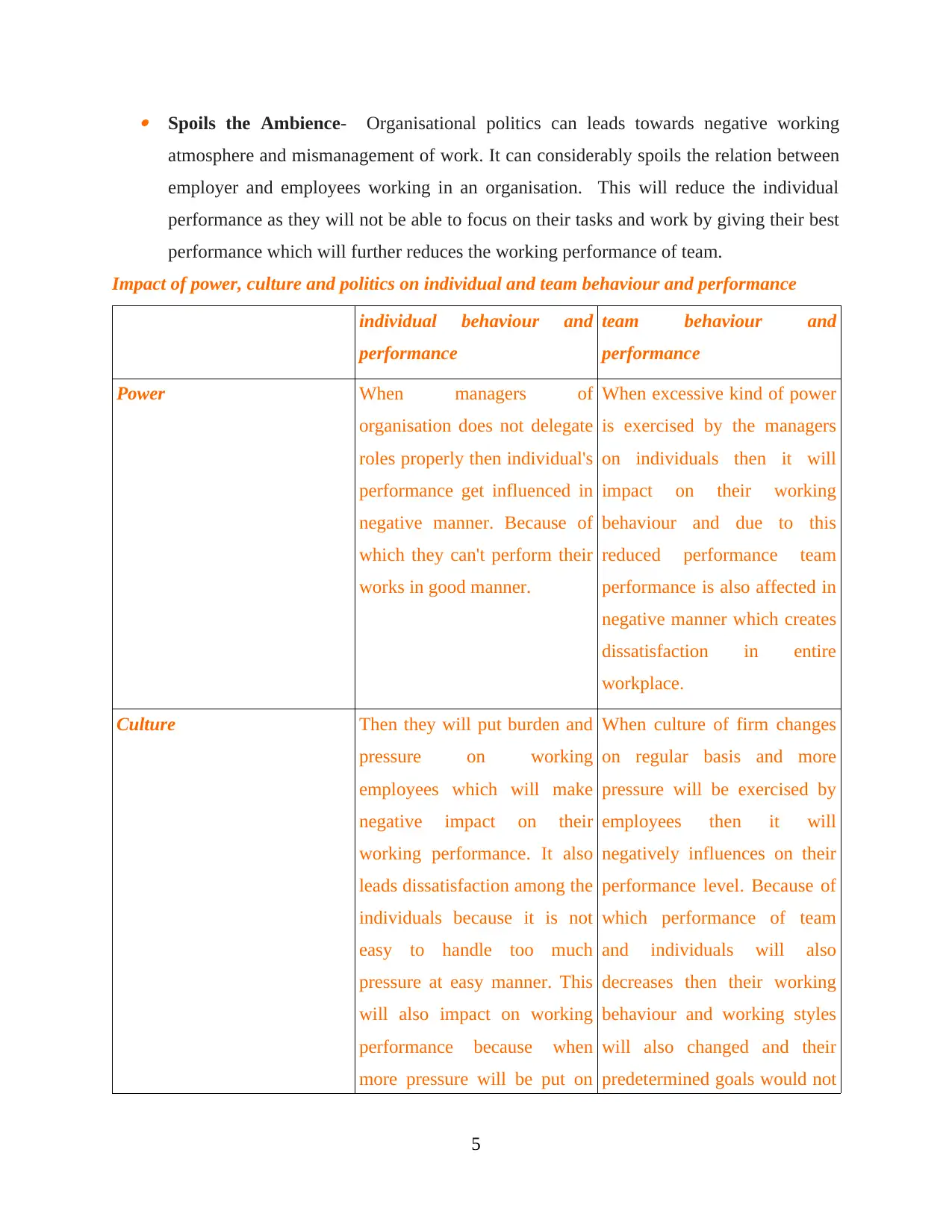
Spoils the Ambience- Organisational politics can leads towards negative working
atmosphere and mismanagement of work. It can considerably spoils the relation between
employer and employees working in an organisation. This will reduce the individual
performance as they will not be able to focus on their tasks and work by giving their best
performance which will further reduces the working performance of team.
Impact of power, culture and politics on individual and team behaviour and performance
individual behaviour and
performance
team behaviour and
performance
Power When managers of
organisation does not delegate
roles properly then individual's
performance get influenced in
negative manner. Because of
which they can't perform their
works in good manner.
When excessive kind of power
is exercised by the managers
on individuals then it will
impact on their working
behaviour and due to this
reduced performance team
performance is also affected in
negative manner which creates
dissatisfaction in entire
workplace.
Culture Then they will put burden and
pressure on working
employees which will make
negative impact on their
working performance. It also
leads dissatisfaction among the
individuals because it is not
easy to handle too much
pressure at easy manner. This
will also impact on working
performance because when
more pressure will be put on
When culture of firm changes
on regular basis and more
pressure will be exercised by
employees then it will
negatively influences on their
performance level. Because of
which performance of team
and individuals will also
decreases then their working
behaviour and working styles
will also changed and their
predetermined goals would not
5
atmosphere and mismanagement of work. It can considerably spoils the relation between
employer and employees working in an organisation. This will reduce the individual
performance as they will not be able to focus on their tasks and work by giving their best
performance which will further reduces the working performance of team.
Impact of power, culture and politics on individual and team behaviour and performance
individual behaviour and
performance
team behaviour and
performance
Power When managers of
organisation does not delegate
roles properly then individual's
performance get influenced in
negative manner. Because of
which they can't perform their
works in good manner.
When excessive kind of power
is exercised by the managers
on individuals then it will
impact on their working
behaviour and due to this
reduced performance team
performance is also affected in
negative manner which creates
dissatisfaction in entire
workplace.
Culture Then they will put burden and
pressure on working
employees which will make
negative impact on their
working performance. It also
leads dissatisfaction among the
individuals because it is not
easy to handle too much
pressure at easy manner. This
will also impact on working
performance because when
more pressure will be put on
When culture of firm changes
on regular basis and more
pressure will be exercised by
employees then it will
negatively influences on their
performance level. Because of
which performance of team
and individuals will also
decreases then their working
behaviour and working styles
will also changed and their
predetermined goals would not
5
Paraphrase This Document
Need a fresh take? Get an instant paraphrase of this document with our AI Paraphraser
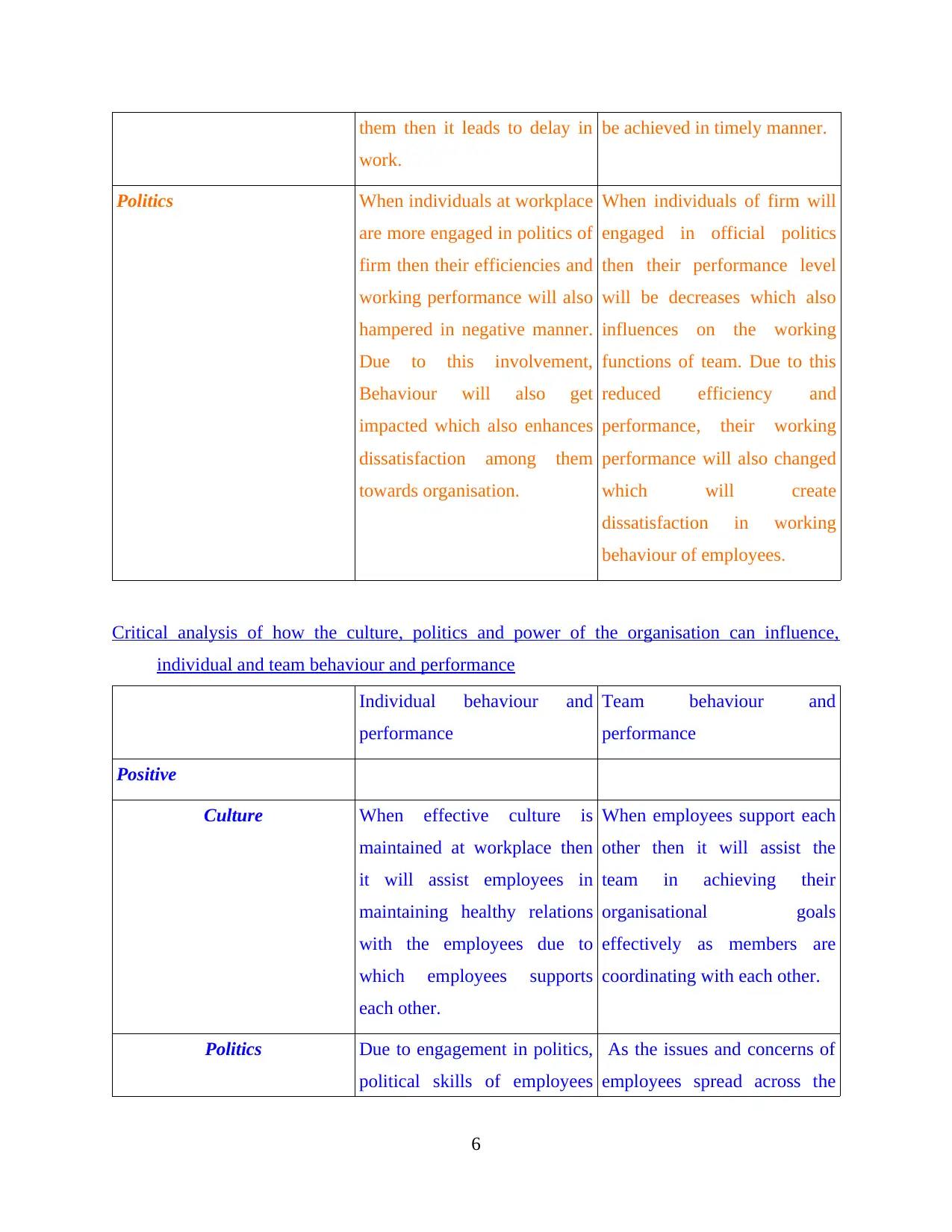
them then it leads to delay in
work.
be achieved in timely manner.
Politics When individuals at workplace
are more engaged in politics of
firm then their efficiencies and
working performance will also
hampered in negative manner.
Due to this involvement,
Behaviour will also get
impacted which also enhances
dissatisfaction among them
towards organisation.
When individuals of firm will
engaged in official politics
then their performance level
will be decreases which also
influences on the working
functions of team. Due to this
reduced efficiency and
performance, their working
performance will also changed
which will create
dissatisfaction in working
behaviour of employees.
Critical analysis of how the culture, politics and power of the organisation can influence,
individual and team behaviour and performance
Individual behaviour and
performance
Team behaviour and
performance
Positive
Culture When effective culture is
maintained at workplace then
it will assist employees in
maintaining healthy relations
with the employees due to
which employees supports
each other.
When employees support each
other then it will assist the
team in achieving their
organisational goals
effectively as members are
coordinating with each other.
Politics Due to engagement in politics,
political skills of employees
As the issues and concerns of
employees spread across the
6
work.
be achieved in timely manner.
Politics When individuals at workplace
are more engaged in politics of
firm then their efficiencies and
working performance will also
hampered in negative manner.
Due to this involvement,
Behaviour will also get
impacted which also enhances
dissatisfaction among them
towards organisation.
When individuals of firm will
engaged in official politics
then their performance level
will be decreases which also
influences on the working
functions of team. Due to this
reduced efficiency and
performance, their working
performance will also changed
which will create
dissatisfaction in working
behaviour of employees.
Critical analysis of how the culture, politics and power of the organisation can influence,
individual and team behaviour and performance
Individual behaviour and
performance
Team behaviour and
performance
Positive
Culture When effective culture is
maintained at workplace then
it will assist employees in
maintaining healthy relations
with the employees due to
which employees supports
each other.
When employees support each
other then it will assist the
team in achieving their
organisational goals
effectively as members are
coordinating with each other.
Politics Due to engagement in politics,
political skills of employees
As the issues and concerns of
employees spread across the
6
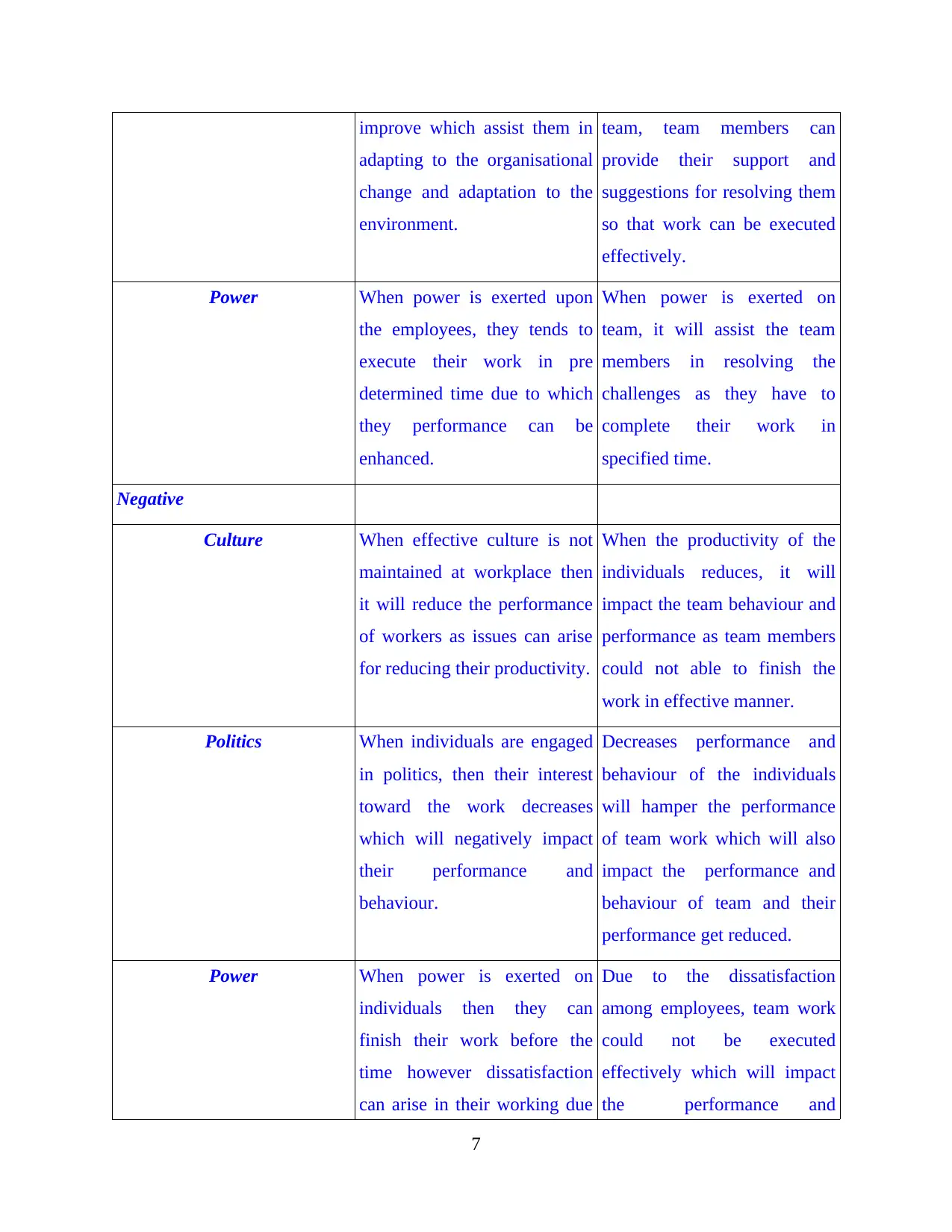
improve which assist them in
adapting to the organisational
change and adaptation to the
environment.
team, team members can
provide their support and
suggestions for resolving them
so that work can be executed
effectively.
Power When power is exerted upon
the employees, they tends to
execute their work in pre
determined time due to which
they performance can be
enhanced.
When power is exerted on
team, it will assist the team
members in resolving the
challenges as they have to
complete their work in
specified time.
Negative
Culture When effective culture is not
maintained at workplace then
it will reduce the performance
of workers as issues can arise
for reducing their productivity.
When the productivity of the
individuals reduces, it will
impact the team behaviour and
performance as team members
could not able to finish the
work in effective manner.
Politics When individuals are engaged
in politics, then their interest
toward the work decreases
which will negatively impact
their performance and
behaviour.
Decreases performance and
behaviour of the individuals
will hamper the performance
of team work which will also
impact the performance and
behaviour of team and their
performance get reduced.
Power When power is exerted on
individuals then they can
finish their work before the
time however dissatisfaction
can arise in their working due
Due to the dissatisfaction
among employees, team work
could not be executed
effectively which will impact
the performance and
7
adapting to the organisational
change and adaptation to the
environment.
team, team members can
provide their support and
suggestions for resolving them
so that work can be executed
effectively.
Power When power is exerted upon
the employees, they tends to
execute their work in pre
determined time due to which
they performance can be
enhanced.
When power is exerted on
team, it will assist the team
members in resolving the
challenges as they have to
complete their work in
specified time.
Negative
Culture When effective culture is not
maintained at workplace then
it will reduce the performance
of workers as issues can arise
for reducing their productivity.
When the productivity of the
individuals reduces, it will
impact the team behaviour and
performance as team members
could not able to finish the
work in effective manner.
Politics When individuals are engaged
in politics, then their interest
toward the work decreases
which will negatively impact
their performance and
behaviour.
Decreases performance and
behaviour of the individuals
will hamper the performance
of team work which will also
impact the performance and
behaviour of team and their
performance get reduced.
Power When power is exerted on
individuals then they can
finish their work before the
time however dissatisfaction
can arise in their working due
Due to the dissatisfaction
among employees, team work
could not be executed
effectively which will impact
the performance and
7
⊘ This is a preview!⊘
Do you want full access?
Subscribe today to unlock all pages.

Trusted by 1+ million students worldwide
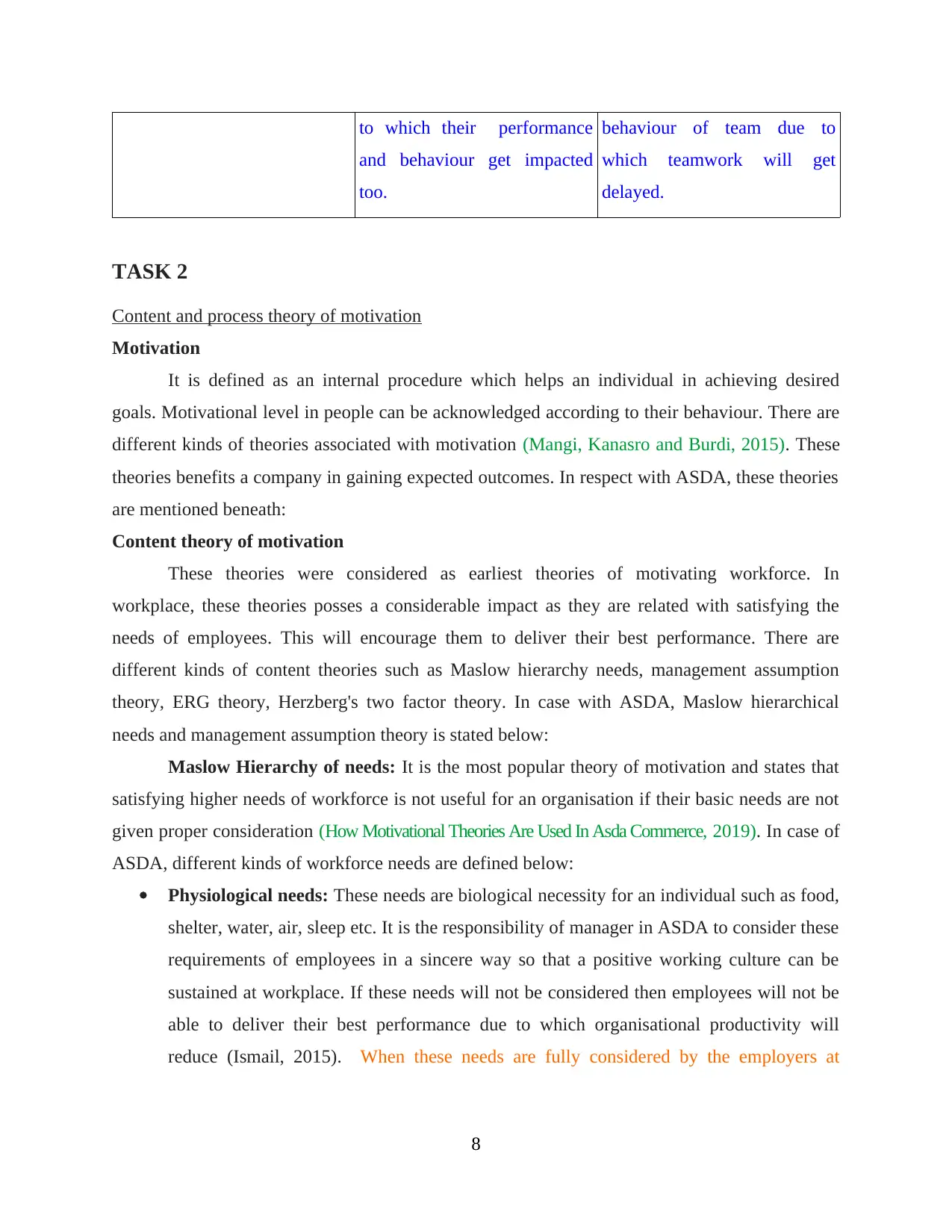
to which their performance
and behaviour get impacted
too.
behaviour of team due to
which teamwork will get
delayed.
TASK 2
Content and process theory of motivation
Motivation
It is defined as an internal procedure which helps an individual in achieving desired
goals. Motivational level in people can be acknowledged according to their behaviour. There are
different kinds of theories associated with motivation (Mangi, Kanasro and Burdi, 2015). These
theories benefits a company in gaining expected outcomes. In respect with ASDA, these theories
are mentioned beneath:
Content theory of motivation
These theories were considered as earliest theories of motivating workforce. In
workplace, these theories posses a considerable impact as they are related with satisfying the
needs of employees. This will encourage them to deliver their best performance. There are
different kinds of content theories such as Maslow hierarchy needs, management assumption
theory, ERG theory, Herzberg's two factor theory. In case with ASDA, Maslow hierarchical
needs and management assumption theory is stated below:
Maslow Hierarchy of needs: It is the most popular theory of motivation and states that
satisfying higher needs of workforce is not useful for an organisation if their basic needs are not
given proper consideration (How Motivational Theories Are Used In Asda Commerce, 2019). In case of
ASDA, different kinds of workforce needs are defined below:
Physiological needs: These needs are biological necessity for an individual such as food,
shelter, water, air, sleep etc. It is the responsibility of manager in ASDA to consider these
requirements of employees in a sincere way so that a positive working culture can be
sustained at workplace. If these needs will not be considered then employees will not be
able to deliver their best performance due to which organisational productivity will
reduce (Ismail, 2015). When these needs are fully considered by the employers at
8
and behaviour get impacted
too.
behaviour of team due to
which teamwork will get
delayed.
TASK 2
Content and process theory of motivation
Motivation
It is defined as an internal procedure which helps an individual in achieving desired
goals. Motivational level in people can be acknowledged according to their behaviour. There are
different kinds of theories associated with motivation (Mangi, Kanasro and Burdi, 2015). These
theories benefits a company in gaining expected outcomes. In respect with ASDA, these theories
are mentioned beneath:
Content theory of motivation
These theories were considered as earliest theories of motivating workforce. In
workplace, these theories posses a considerable impact as they are related with satisfying the
needs of employees. This will encourage them to deliver their best performance. There are
different kinds of content theories such as Maslow hierarchy needs, management assumption
theory, ERG theory, Herzberg's two factor theory. In case with ASDA, Maslow hierarchical
needs and management assumption theory is stated below:
Maslow Hierarchy of needs: It is the most popular theory of motivation and states that
satisfying higher needs of workforce is not useful for an organisation if their basic needs are not
given proper consideration (How Motivational Theories Are Used In Asda Commerce, 2019). In case of
ASDA, different kinds of workforce needs are defined below:
Physiological needs: These needs are biological necessity for an individual such as food,
shelter, water, air, sleep etc. It is the responsibility of manager in ASDA to consider these
requirements of employees in a sincere way so that a positive working culture can be
sustained at workplace. If these needs will not be considered then employees will not be
able to deliver their best performance due to which organisational productivity will
reduce (Ismail, 2015). When these needs are fully considered by the employers at
8
Paraphrase This Document
Need a fresh take? Get an instant paraphrase of this document with our AI Paraphraser
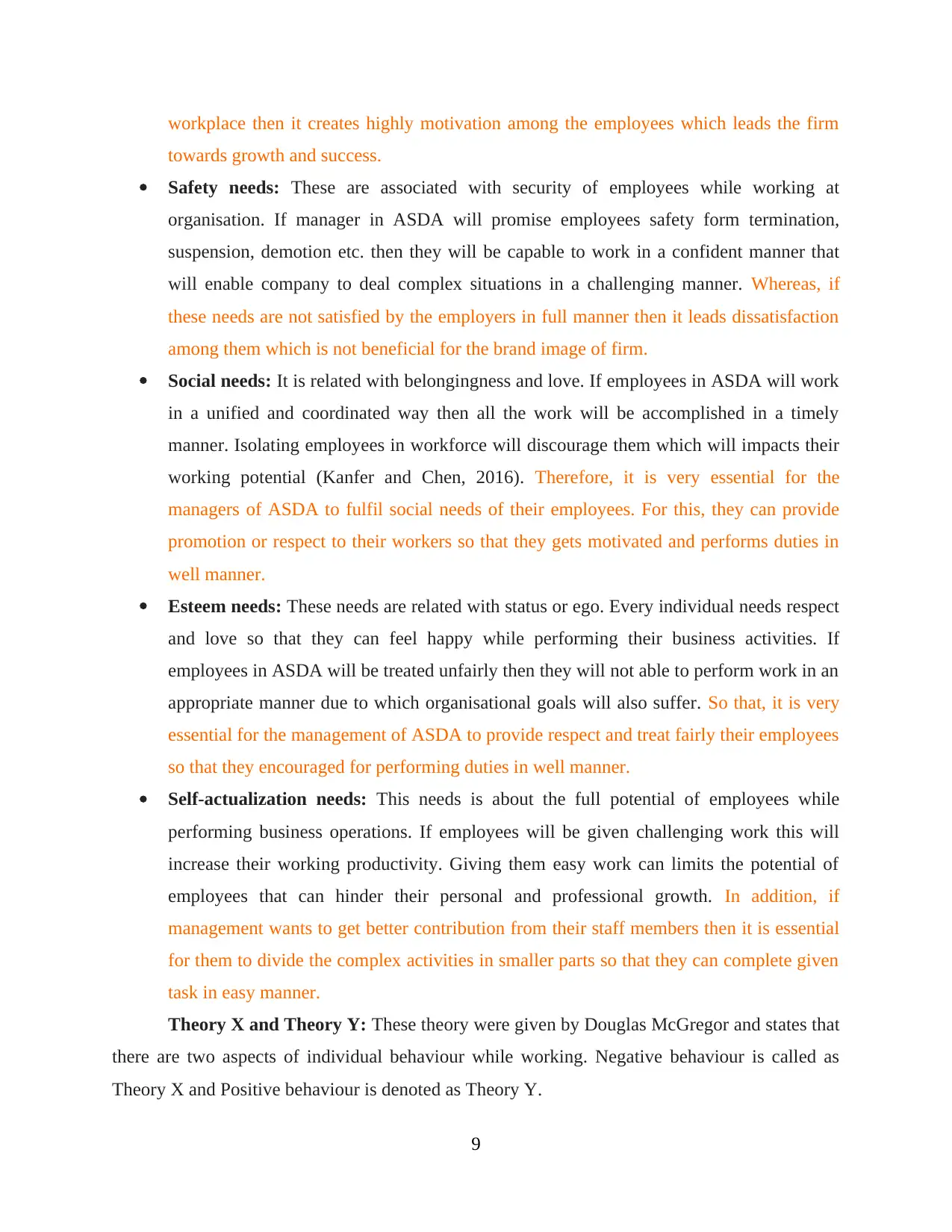
workplace then it creates highly motivation among the employees which leads the firm
towards growth and success.
Safety needs: These are associated with security of employees while working at
organisation. If manager in ASDA will promise employees safety form termination,
suspension, demotion etc. then they will be capable to work in a confident manner that
will enable company to deal complex situations in a challenging manner. Whereas, if
these needs are not satisfied by the employers in full manner then it leads dissatisfaction
among them which is not beneficial for the brand image of firm.
Social needs: It is related with belongingness and love. If employees in ASDA will work
in a unified and coordinated way then all the work will be accomplished in a timely
manner. Isolating employees in workforce will discourage them which will impacts their
working potential (Kanfer and Chen, 2016). Therefore, it is very essential for the
managers of ASDA to fulfil social needs of their employees. For this, they can provide
promotion or respect to their workers so that they gets motivated and performs duties in
well manner.
Esteem needs: These needs are related with status or ego. Every individual needs respect
and love so that they can feel happy while performing their business activities. If
employees in ASDA will be treated unfairly then they will not able to perform work in an
appropriate manner due to which organisational goals will also suffer. So that, it is very
essential for the management of ASDA to provide respect and treat fairly their employees
so that they encouraged for performing duties in well manner.
Self-actualization needs: This needs is about the full potential of employees while
performing business operations. If employees will be given challenging work this will
increase their working productivity. Giving them easy work can limits the potential of
employees that can hinder their personal and professional growth. In addition, if
management wants to get better contribution from their staff members then it is essential
for them to divide the complex activities in smaller parts so that they can complete given
task in easy manner.
Theory X and Theory Y: These theory were given by Douglas McGregor and states that
there are two aspects of individual behaviour while working. Negative behaviour is called as
Theory X and Positive behaviour is denoted as Theory Y.
9
towards growth and success.
Safety needs: These are associated with security of employees while working at
organisation. If manager in ASDA will promise employees safety form termination,
suspension, demotion etc. then they will be capable to work in a confident manner that
will enable company to deal complex situations in a challenging manner. Whereas, if
these needs are not satisfied by the employers in full manner then it leads dissatisfaction
among them which is not beneficial for the brand image of firm.
Social needs: It is related with belongingness and love. If employees in ASDA will work
in a unified and coordinated way then all the work will be accomplished in a timely
manner. Isolating employees in workforce will discourage them which will impacts their
working potential (Kanfer and Chen, 2016). Therefore, it is very essential for the
managers of ASDA to fulfil social needs of their employees. For this, they can provide
promotion or respect to their workers so that they gets motivated and performs duties in
well manner.
Esteem needs: These needs are related with status or ego. Every individual needs respect
and love so that they can feel happy while performing their business activities. If
employees in ASDA will be treated unfairly then they will not able to perform work in an
appropriate manner due to which organisational goals will also suffer. So that, it is very
essential for the management of ASDA to provide respect and treat fairly their employees
so that they encouraged for performing duties in well manner.
Self-actualization needs: This needs is about the full potential of employees while
performing business operations. If employees will be given challenging work this will
increase their working productivity. Giving them easy work can limits the potential of
employees that can hinder their personal and professional growth. In addition, if
management wants to get better contribution from their staff members then it is essential
for them to divide the complex activities in smaller parts so that they can complete given
task in easy manner.
Theory X and Theory Y: These theory were given by Douglas McGregor and states that
there are two aspects of individual behaviour while working. Negative behaviour is called as
Theory X and Positive behaviour is denoted as Theory Y.
9
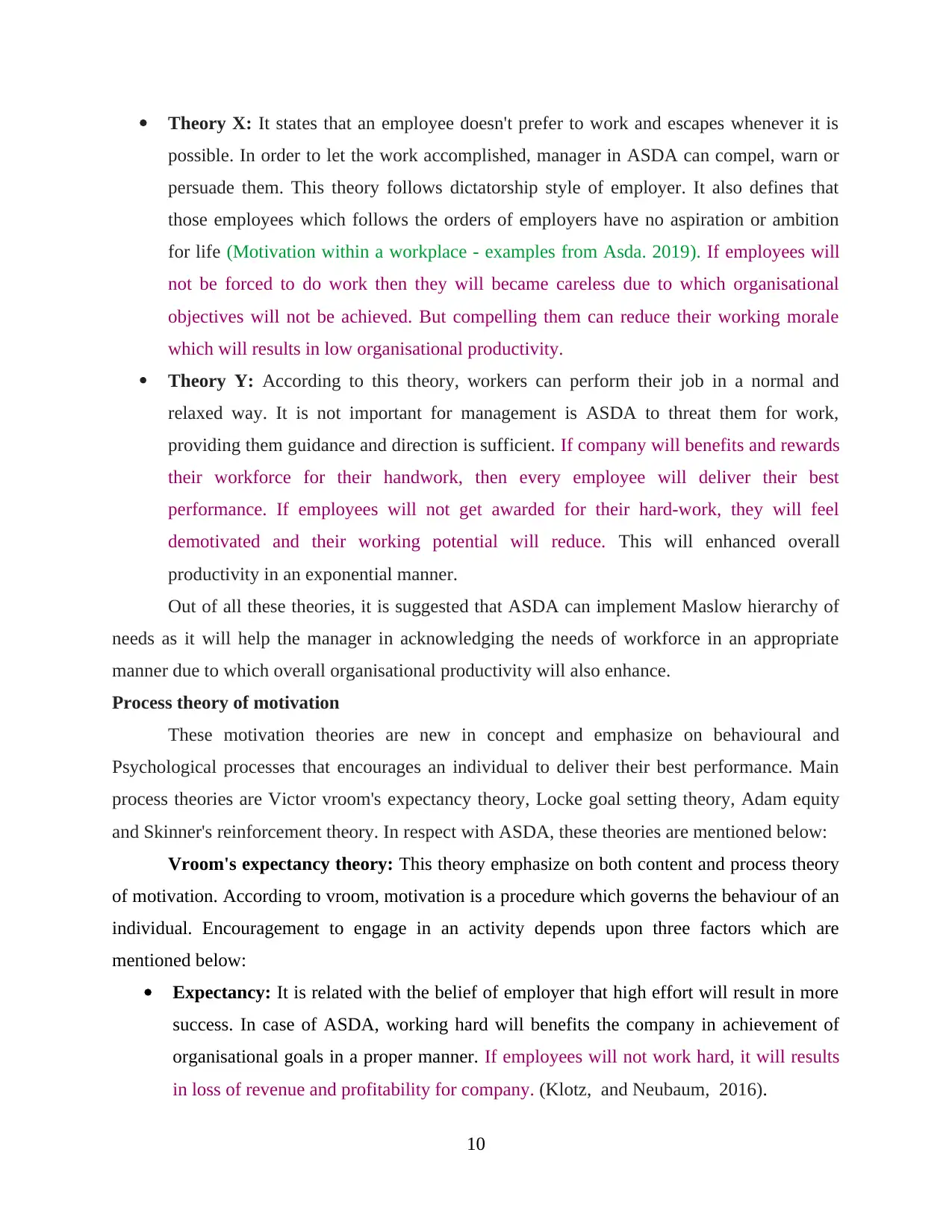
Theory X: It states that an employee doesn't prefer to work and escapes whenever it is
possible. In order to let the work accomplished, manager in ASDA can compel, warn or
persuade them. This theory follows dictatorship style of employer. It also defines that
those employees which follows the orders of employers have no aspiration or ambition
for life (Motivation within a workplace - examples from Asda. 2019). If employees will
not be forced to do work then they will became careless due to which organisational
objectives will not be achieved. But compelling them can reduce their working morale
which will results in low organisational productivity.
Theory Y: According to this theory, workers can perform their job in a normal and
relaxed way. It is not important for management is ASDA to threat them for work,
providing them guidance and direction is sufficient. If company will benefits and rewards
their workforce for their handwork, then every employee will deliver their best
performance. If employees will not get awarded for their hard-work, they will feel
demotivated and their working potential will reduce. This will enhanced overall
productivity in an exponential manner.
Out of all these theories, it is suggested that ASDA can implement Maslow hierarchy of
needs as it will help the manager in acknowledging the needs of workforce in an appropriate
manner due to which overall organisational productivity will also enhance.
Process theory of motivation
These motivation theories are new in concept and emphasize on behavioural and
Psychological processes that encourages an individual to deliver their best performance. Main
process theories are Victor vroom's expectancy theory, Locke goal setting theory, Adam equity
and Skinner's reinforcement theory. In respect with ASDA, these theories are mentioned below:
Vroom's expectancy theory: This theory emphasize on both content and process theory
of motivation. According to vroom, motivation is a procedure which governs the behaviour of an
individual. Encouragement to engage in an activity depends upon three factors which are
mentioned below:
Expectancy: It is related with the belief of employer that high effort will result in more
success. In case of ASDA, working hard will benefits the company in achievement of
organisational goals in a proper manner. If employees will not work hard, it will results
in loss of revenue and profitability for company. (Klotz, and Neubaum, 2016).
10
possible. In order to let the work accomplished, manager in ASDA can compel, warn or
persuade them. This theory follows dictatorship style of employer. It also defines that
those employees which follows the orders of employers have no aspiration or ambition
for life (Motivation within a workplace - examples from Asda. 2019). If employees will
not be forced to do work then they will became careless due to which organisational
objectives will not be achieved. But compelling them can reduce their working morale
which will results in low organisational productivity.
Theory Y: According to this theory, workers can perform their job in a normal and
relaxed way. It is not important for management is ASDA to threat them for work,
providing them guidance and direction is sufficient. If company will benefits and rewards
their workforce for their handwork, then every employee will deliver their best
performance. If employees will not get awarded for their hard-work, they will feel
demotivated and their working potential will reduce. This will enhanced overall
productivity in an exponential manner.
Out of all these theories, it is suggested that ASDA can implement Maslow hierarchy of
needs as it will help the manager in acknowledging the needs of workforce in an appropriate
manner due to which overall organisational productivity will also enhance.
Process theory of motivation
These motivation theories are new in concept and emphasize on behavioural and
Psychological processes that encourages an individual to deliver their best performance. Main
process theories are Victor vroom's expectancy theory, Locke goal setting theory, Adam equity
and Skinner's reinforcement theory. In respect with ASDA, these theories are mentioned below:
Vroom's expectancy theory: This theory emphasize on both content and process theory
of motivation. According to vroom, motivation is a procedure which governs the behaviour of an
individual. Encouragement to engage in an activity depends upon three factors which are
mentioned below:
Expectancy: It is related with the belief of employer that high effort will result in more
success. In case of ASDA, working hard will benefits the company in achievement of
organisational goals in a proper manner. If employees will not work hard, it will results
in loss of revenue and profitability for company. (Klotz, and Neubaum, 2016).
10
⊘ This is a preview!⊘
Do you want full access?
Subscribe today to unlock all pages.

Trusted by 1+ million students worldwide
1 out of 24
Related Documents
Your All-in-One AI-Powered Toolkit for Academic Success.
+13062052269
info@desklib.com
Available 24*7 on WhatsApp / Email
![[object Object]](/_next/static/media/star-bottom.7253800d.svg)
Unlock your academic potential
Copyright © 2020–2026 A2Z Services. All Rights Reserved. Developed and managed by ZUCOL.




